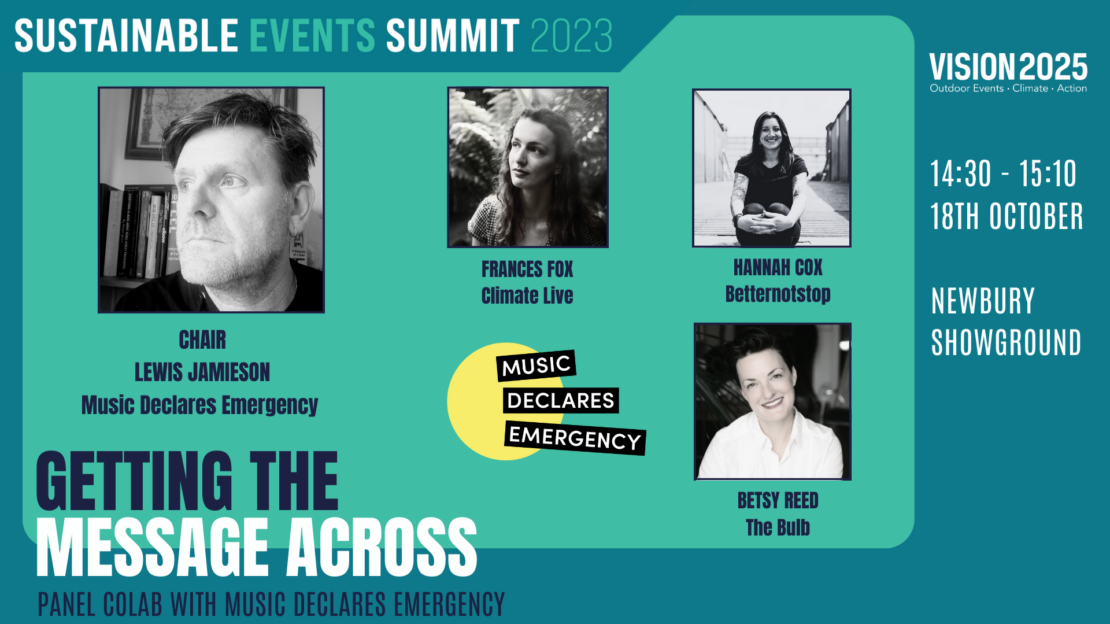Focused on creating effective climate communication campaigns, the ‘Getting the Message Across’ panel at #SES23 runs in collaboration with Music Declares Emergency. Chaired by MDE’s Lewis Jamieson with guests, Betsy Reed, Sustainability Consultant at The Bulb), Hannah Cox (Betternotstop) and Climate Live’s Founder, Frances Fox, the panel explores mainstreaming climate awareness through cultural engagement; good and bad climate messaging and how to create and curate connections across music for maximum impact. In this guest blog, Lewis shares his thoughts on the potential for the music industry to deliver gains beyond the sector.
Register for Free to join this panel at Sustainable Events Summit #SES23, 18th October at The Showman’s Show.
“When we launched Music Declares Emergency in 2019 it is fair to say that the problem was very much the science. Because, whilst the actual science was already pretty settled, applying the urgency that the science revealed to the actions of the music business felt some way off.
In the four or so years since that launch, we’ve travelled a long way. Live Green, The Music Climate Pact, Green Nation, actions and innovations from AEG, Festival Republic, Bluedot, and a host of others have signalled a serious engagement with solutions to music’s contribution to the problem. Emissions have been calculated, new technologies deployed, waste managed, logistics improved. Alliances have been formed and those who were at the forefront of pushing for change, many of whom are speaking during the Sustainable Events Summit, are now working with the industry, and delivering incredible results.
Of late I have been drawn to say that the problem of the climate emergency is no longer one of business action, but of effective public communication. Outside of David Attenborough and, for a younger demographic in the main, Greta Thunberg, little that is said seems to really stick with the public at large. The ‘cause’ is so vast, the specifics so minute, that creating a unifying mass communication strategy is a massive challenge. I could spend days talking through why that may be, but music, or rather the live shows and recordings and, crucially, the artists who sit at the centre of it all, offer a unique opportunity, when supported, to catalyse the radical change of perception we need to realise the comprehensive changes to our lifestyles necessary to answer the challenge.
The scramble to secure Taylor Swift tickets may not be an obvious starting point here but, for me, it illustrates perfectly that still present ability of some of our biggest stars to command the zeitgeist completely for a period of time. In a 24-hour rolling news world that is incredibly powerful. In the fan reaction and dedication to securing tickets we see not just the need to be close to their favourite artist but a sense of community amongst fans that reminds me of the power of music to bring disparate people together across borders and time zones.
And it’s not just the younger fans that have this impulse now. Given my age and connections on social is it any wonder that two highlights of my summer were the Pulp and Blur shows? Aside from time capsuling me back to 1995 or so, sharing stories with old friends, meeting up at the shows, and the sheer joy that radiated from social media posts emphasised that pop music, our music, is now not just a youth concern.
This summer is a great visual amplifier of just how popular pop music has become. We saw a clutch of headline stories around the financial contribution of outdoor events to regional economies with 1 million people out at a gig on one landmark weekend in London (London’s music scene roars back as more than 1 million people attend live music events across the capital in one week | London City Hall), and a UK Music report showing 14.4 million ‘music tourists’ for UK live events in 2022.
Access to that many people, gathered around something that is a shared interest, focused on a single or small number of performers, is unique to music. Sport has similarities but your favourite footballer is not going to stop the game to make a point about the climate. Artists can, and do, do that. The thrill we at MDE feel every time we see Billie Eilish display No Music On A Dead Planet at her shows is not ego, it is the realisation that the message is being transmitted to open minds and making a difference.
And we know that many more artists are keen to make a difference. What they need is a supportive platform.
Within the industry, our actions can facilitate this. Working with artists to deliver products that underline their commitment to change amplifies the message, delivering shows that are visibly engaged with emissions reduction strategies allows them to speak with authority to their audience about joining together to act consciously as individuals and collectively as citizens to demand the systemic changes we need.
- Let’s work together to combine that amazing reach that we have already seen over the summer of our live events.
- Let’s talk about how we can help to solve this problem beyond our own businesses by showcasing our innovations and our radical thinking.
- Let’s support the artists who are ready to speak, the festivals and touring crews that are already making the changes on the ground, the campaigners that are ready to partner with music to inspire the public.
- Let’s facilitate the incredible power of artists to inspire and motivate and use the window of positivity that our shows generate in music lovers to reframe this conversation.
- Let’s talk about how the roar of a stadium or a festival can be translated into a voice for change towards those in key positions.
- Let’s collectively create that positive future where we sustain and nurture the natural world and protect and empower those currently being worst affected by the climate emergency.
Remember:
We already know the problem.
We already know the solutions.
We have the solutions to hand.
All we need now is the will to do it.”
Follow Lewis Jamieson on Linkedin.
Find out more about Music Declares Emergency
Follow MDE on Socials: Instagram | Twitter | Facebook
This article originally appeared in our October 2023 Vision: 2025 newsletter. Sign up to receive monthly event sustainability news, case studies and guest blogs direct to your inbox.


